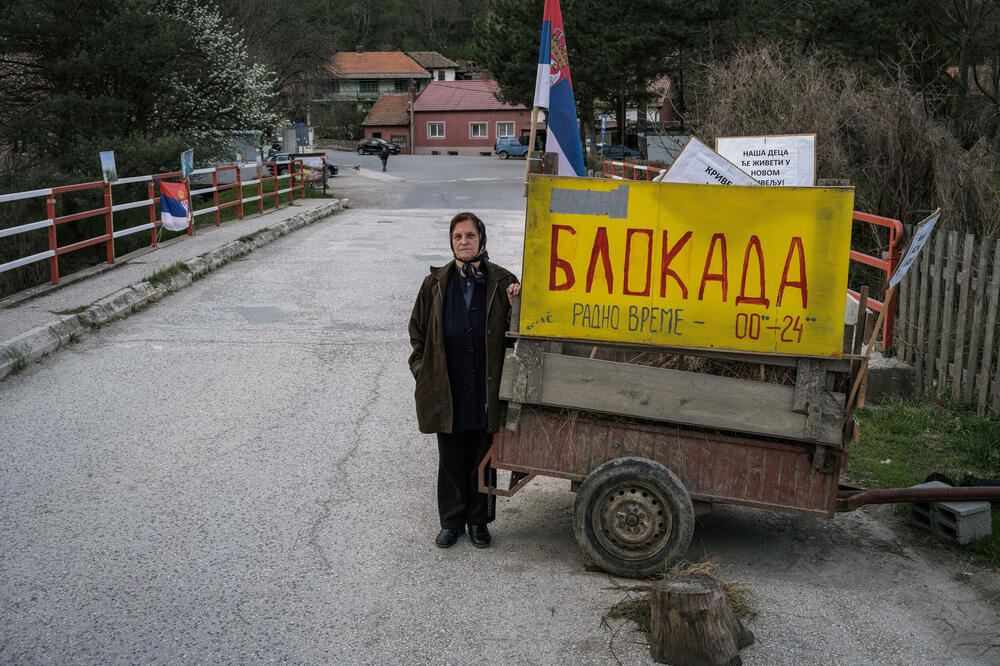They are nurses, teachers, students and housewives. They represent three generations, and they are ready to fight.
More than twenty women are at the center of the fight to move their village in eastern Serbia away from the copper mine, which they say has polluted the land and water and destroyed the surrounding environment.
Before dawn, 78-year-old Vukosava Radivojević prepares breakfast for her husband and goes to her village in eastern Serbia to guard the barricade that prevents trucks from entering the copper mine.
Radivojević is one of about twenty women who, since January, have been taking turns day and night on a small bridge in Krivelje to protest against the mine, managed by a subsidiary of the Chinese company Ziđin Mining, which dominates the landscape and approaches their homes.

While their husbands are at work, the women are fighting to convince the company to relocate their village away from what they describe as constant noise, tremors and pollution.
Ziđin has already displaced many villagers. However, most of those who remained are Vlachs - Orthodox Christians who have preserved their language and customs through the ages. They want to move in together.
"We are forced to block the road, because we are poisoned, everything is polluted, we can no longer grow vegetables," Radivojevic told Reuters while standing at the roadblock.
"We just want to be safe, we've earned that right."
Ziđin subsidiary Serbia Ziđin koper admits there are problems, which it claims it inherited from the local company when it took over operations in 2018.
According to a study commissioned by the company and published in December, the small river Krivelj is polluted with heavy metals. Increased levels of mercury, arsenic and cadmium were found in the soil, Reuters reports.
"There were serious direct emissions of gases and waste water at the site, which resulted in a high degree of pollution of the environment including air, rivers and soil," according to the company's statement submitted to the British agency.
It is said that more than 100 million dollars have been invested to reduce the impact on the environment, including the improvement of the waste water recycling system.
Ziđin announced that it is "dedicated to work on relocation plans in a transparent and fair manner" and that they are in contact with all involved parties. One local official said they hope the relocation will be completed by the end of 2025.

"We defend the villages and houses where we were born. I'm sorry for our beautiful village, I'm not sure I'll survive the move," said Stana Jorgovanović, a 79-year-old housewife while standing at the barricade.
Earlier this month, Ziđin agreed to stop the passage of large trucks through the village, said community leader Jasna Tomić, which is an indication that the women have achieved some success. Residents temporarily removed the roadblocks to allow the company to complete some of the work.
The struggle for a satisfactory place to relocate them continues.
Krivelj used to be a picturesque village surrounded by green hills. A fair was organized every year, attracting visitors from neighboring villages.
Then the mine started working in the 1970s. The concentration of sulfur dioxide in the air became so high that it made holes in women's nylon stockings, locals told Reuters.
Since then, the standard has improved, but production has quadrupled since Ziđin took over, meaning more trucks and more dust, residents said.
The landscape is marred by piles of mining waste. Lines of orange trucks meander through a valley of brown. The walls of the houses cracked from the tremors caused by the underground explosions, the locals said.
The number of school-aged children has dropped by two-thirds, retired teacher Aleksa Radonjić told Reuters. Young families are leaving, and the fair has not been organized for years.
"I want the new village of Krivelj. I need a piece of land, a church and a cemetery," said Milosava Fufanović, a primary school teacher. "If everyone leaves the barricades, I will stay."
The barricade, erected in January, became a symbol of Krivelje's defiance. Over time, it became a second home for women: the interior is heated by a wood-burning stove and a television is installed. Neighbors visit them bringing food and coffee. Occasionally dogs keep them company.
"One day I was standing in the center of the village, and I saw trucks passing one after another. The small bridge buckled under their weight," said Radivojević.
"Then I told my daughter that we have to do something".
Housewife Marija Bufanović, 53, is among the first to set up a barricade. "There is no life here," she said. "We want to go together".
Meanwhile, the villagers discuss where they might end up. The company proposed an area near Ziđin's second mine, Tomić told Reuters.
"We want that new village to be called Krivelj as well. Of course there won't be a river there, but we want to relocate the church, library and school".
Bonus video:




